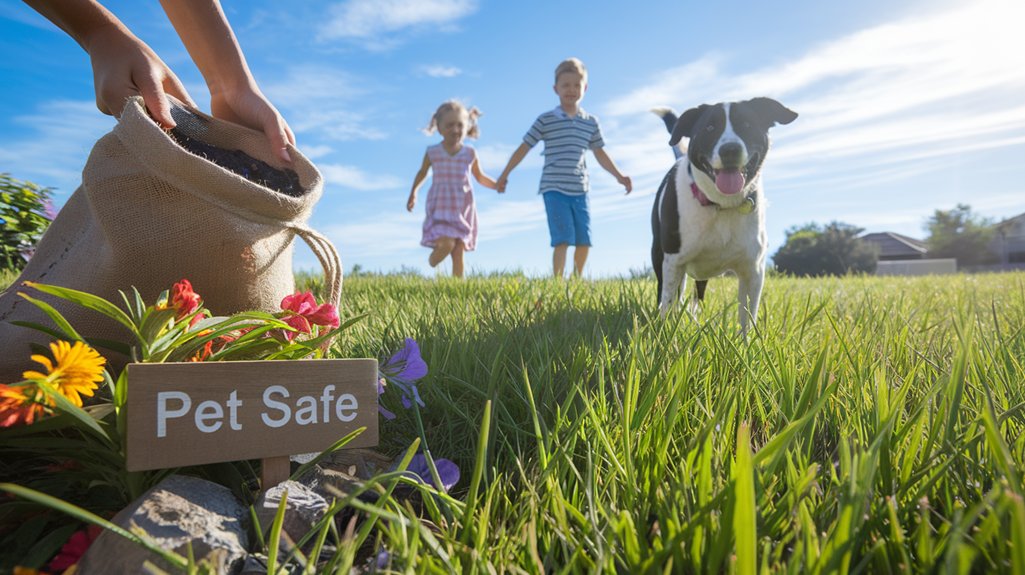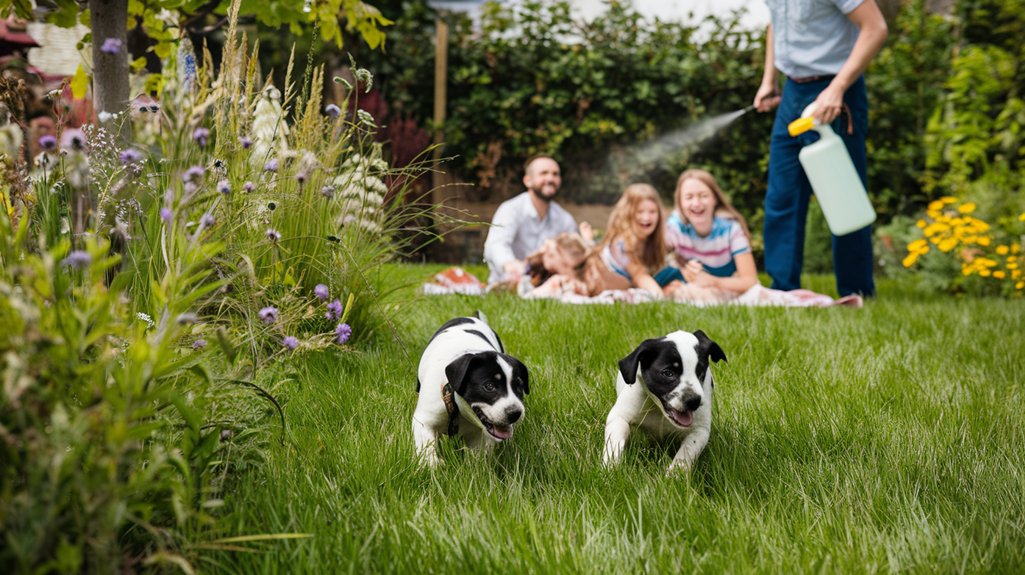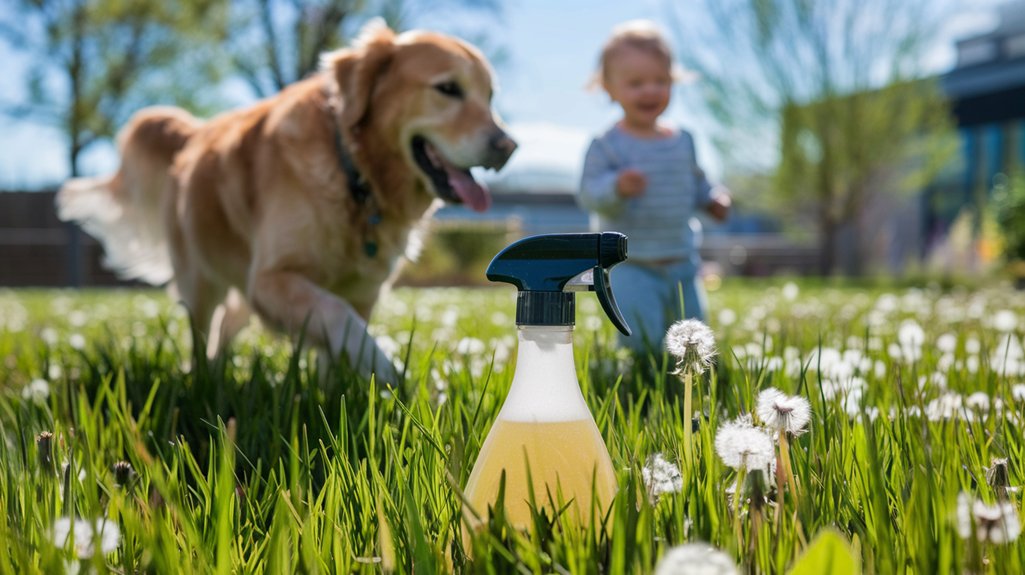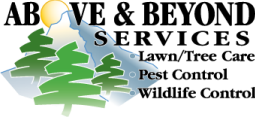As a pet owner, you want a yard that's safe for your furry friends and kids. Traditional lawn care often relies on chemicals that can pose risks to their health. Fortunately, there are effective organic alternatives that keep your lawn lush without harmful side effects. By exploring natural treatments and practices, you can create a vibrant outdoor space. Discover how these methods can transform your yard into a haven for your family and pets.
Key Takeaways
- Opt for organic lawn care to reduce chemical exposure for both pets and children, promoting a healthier environment.
- Utilize natural weed control methods like vinegar, corn gluten meal, and hand-pulling to maintain a safe yard.
- Implement Integrated Pest Management (IPM) strategies, incorporating beneficial insects and plant-based repellents to protect your pets.
- Focus on creating a healthy soil environment by adding organic matter, aerating, and ensuring proper watering techniques.
- Regularly test soil to maintain optimal nutrient levels, fostering a robust lawn that supports pet play.
Understanding the Risks of Chemical Lawn Treatments

When you treat your lawn with chemicals, you mightn't realize the potential risks to your pets. Many common lawn treatments contain harmful substances that can lead to chemical exposure, posing serious health risks.
Pets, especially dogs and cats, often spend time on the grass, and their curiosity can lead to ingestion or skin contact with toxic residues. Symptoms of lawn toxicity can include vomiting, diarrhea, and lethargy.
Even if you follow the instructions carefully, the effects of these chemicals can linger, impacting not just your pets but also the surrounding environment.
It's crucial to consider these risks before applying chemical treatments, ensuring your furry friends stay safe and healthy while enjoying your yard.
The Benefits of Organic Lawn Care

Have you ever considered how organic lawn care can benefit both your yard and your pets? Switching to organic methods not only promotes healthier grass but also ensures a safer environment for your furry friends. You'll enjoy sustainability benefits, as natural treatments improve soil health and biodiversity. Plus, you'll see cost savings over time since organic solutions often require less frequent application.
| Organic Lawn Care Benefits | Impact on Pets |
|---|---|
| Healthier soil | Reduced chemical exposure |
| Improved biodiversity | Safer play areas |
| Enhanced resilience | Minimized allergies |
| Long-term cost savings | Better overall health |
With organic lawn care, you create a beautiful yard that's perfect for both kids and pets!
Natural Weed Control Methods

Organic lawn care not only enhances your yard's health but also opens the door to effective natural weed control methods.
One popular option is using natural herbicides like vinegar or salt, which can effectively target unwanted weeds without harming your pets. You can also employ corn gluten meal as a pre-emergent, which not only prevents weed seeds from germinating but adds nutrients to your soil.
For established weeds, simply hand-pulling or using mulch can block sunlight and suppress growth.
Additionally, maintaining a thick, healthy lawn through proper watering and mowing height is key to weed prevention.
Pet-Safe Pest Management Solutions
While enjoying your outdoor space, it's crucial to keep pests at bay without compromising your pets' safety.
By implementing pet-safe pest management solutions, you can protect your yard and your furry friends. Here are some effective strategies:
- Integrated Pest Management (IPM): Combine biological control, habitat manipulation, and monitoring to minimize pest issues.
- Natural Predators: Introduce beneficial insects like ladybugs and lacewings to keep harmful pests in check.
- Eco-Friendly Options: Use plant-based repellents or organic insecticides that won't harm your pets.
- Traps and Barriers: Employ non-toxic traps and physical barriers to deter pests without harsh chemicals.
Choosing Safe Fertilizers for Your Lawn
When you're caring for your lawn as a pet owner, choosing safe fertilizers is essential for keeping your furry friends healthy.
Look for eco-friendly options that are free from harmful chemicals, as these will protect your pets while promoting a lush lawn. Organic fertilizers, like compost or fish emulsion, can provide a great nutrient balance without the risks associated with synthetic products.
Additionally, consider slow-release fertilizers to ensure your lawn gets the nutrients it needs over time, minimizing the chance of runoff that could harm your pets.
Always read labels carefully and opt for products labeled as pet-safe. By making informed choices, you can create a vibrant, pet-friendly yard that your four-legged companions can enjoy.
Creating a Healthy Soil Environment
Maintaining a healthy lawn goes hand in hand with nurturing the soil beneath it.
To create a thriving environment, focus on improving soil composition and enhancing microbial activity. Here are four key steps you can take:
- Test your soil: Determine pH and nutrient levels to know what amendments are needed.
- Add organic matter: Incorporate compost or aged manure to boost nutrients and improve structure.
- Practice proper aeration: Aerate your lawn to alleviate compaction and promote airflow, allowing roots to grow deeper.
- Water wisely: Ensure deep, infrequent watering to encourage strong root systems and support beneficial microbes.
Essential Lawn Care Practices for Families
Creating a safe and enjoyable outdoor space for your family requires more than just regular mowing; it demands thoughtful lawn care practices that cater to both the environment and your loved ones.
Start with family lawn maintenance by choosing natural fertilizers and pest control methods that won't harm kids or pets. Regularly check for any weeds or pests and address them promptly using safe gardening practices.
Water your lawn deeply but less frequently to encourage strong roots, and consider incorporating native plants that thrive in your area while requiring less maintenance.
Rotate your mowing patterns to prevent soil compaction, and leave clippings on the lawn to promote nutrients.
These practices will help maintain a healthy, vibrant yard for everyone to enjoy.
Designing a Pet-Friendly Landscape
Designing a pet-friendly landscape starts with understanding your furry friends' needs and behaviors.
You want a space that's safe and enjoyable for them. Here are some tips to consider in your landscape design:
- Choose pet-friendly plants: Opt for non-toxic varieties like lavender, rosemary, and petunias.
- Create designated play areas: Use durable materials for a dedicated zone where your pets can romp and explore.
- Incorporate shade and shelter: Ensure your pets have cool spots to rest, using trees or pet-friendly structures.
- Avoid harmful chemicals: Stick to natural lawn care practices to keep your yard safe for both pets and children.
With these elements, you can create a beautiful landscape that caters to your pets' needs.
DIY Lawn Care Recipes for a Safe Yard
If you want a safe and thriving yard for your pets, consider using DIY lawn care recipes that are both effective and eco-friendly.
You can create homemade lawn treatments using simple ingredients like vinegar, salt, and baking soda. For example, mix equal parts vinegar and water in a spray bottle to tackle weeds without harmful chemicals.
Another option is combining baking soda with water to create a natural fertilizer that nourishes your lawn while keeping it pet-friendly.
You might also try a saltwater solution to deter pests.
By opting for these eco-friendly options, you'll maintain a lush lawn while ensuring a safe environment for your furry friends.
Embrace these homemade solutions for a healthy, vibrant yard!
Frequently Asked Questions
How Can I Tell if My Lawn Is Pet-Friendly?
To tell if your lawn's pet-friendly, watch for lawn signs like your pet avoiding certain areas or exhibiting discomfort. If they're happily playing and exploring, it's likely a safe environment for them.
What Lawn Grasses Are Safest for Pets?
When choosing safe grass varieties, consider fescue, ryegrass, and Bermuda. These options provide pet-friendly landscaping while ensuring your furry friends can play safely. Always check for any specific allergies your pets might have, too.
Are There Any Lawn Treatments to Avoid Completely?
When caring for your lawn, avoid chemical fertilizers and toxic herbicides. They can harm pets and kids. Instead, opt for organic treatments that promote a healthy yard without risking the safety of your loved ones.
How Often Should I Treat My Lawn for Pests?
You should treat your lawn for pests based on monitoring lawn health. Typically, it's wise to check every few weeks during peak pest seasons, adjusting frequency as needed to maintain a healthy, thriving yard.
Can My Pets Help With Lawn Care?
Absolutely, your pets can be great lawn helpers! They naturally aerate the soil and control pests. Just ensure their activities align with safe, natural lawn maintenance practices to keep your yard healthy and pet-friendly.
Conclusion
By choosing organic lawn care, you're not just creating a beautiful yard; you're ensuring a safe space for your kids and pets to play. Embracing natural treatments and practices helps you manage weeds and pests without harmful chemicals. Remember, a healthy lawn starts with nurturing the soil and using pet-friendly solutions. With a little effort and care, you can enjoy a vibrant outdoor environment that benefits everyone in the family, furry friends included!
